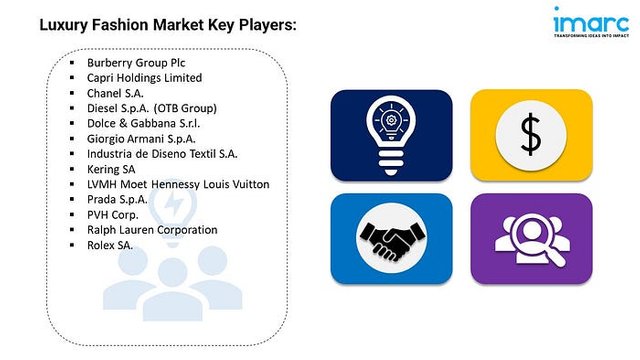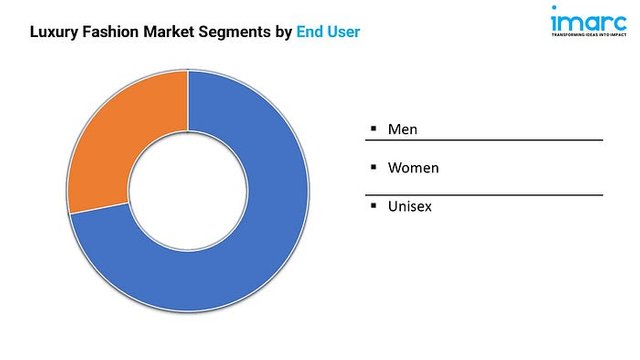Market Overview:
The luxury fashion market is experiencing rapid growth, driven by digital & experiential retail, sustainability & ethical values, and personalization & exclusivity. According to IMARC Group's latest research publication, "Luxury Fashion Market Report by Product Type (Clothing & Apparel, Footwear, Accessories), Distribution Channel (Store-Based, Non-Store Based), End User (Men, Women, Unisex), and Region 2025-2033", The global luxury fashion market size reached USD 253.3 Billion in 2024. Looking forward, IMARC Group expects the market to reach USD 334.6 Billion by 2033, exhibiting a growth rate (CAGR) of 3.05% during 2025-2033.
This detailed analysis primarily encompasses industry size, business trends, market share, key growth factors, and regional forecasts. The report offers a comprehensive overview and integrates research findings, market assessments, and data from different sources. It also includes pivotal market dynamics like drivers and challenges, while also highlighting growth opportunities, financial insights, technological improvements, emerging trends, and innovations. Besides this, the report provides regional market evaluation, along with a competitive landscape analysis.
Grab a sample PDF of this report: https://www.imarcgroup.com/luxury-fashion-market/requestsample
Our report includes:
- Market Dynamics
- Market Trends And Market Outlook
- Competitive Analysis
- Industry Segmentation
- Strategic Recommendations
Factors Affecting the Growth of the Luxury Fashion Industry:
- Digital & Experiential Retail:
The luxury fashion market is changing. Digital and physical retail are merging. Brands are using e-commerce, social media, and immersive techniques to reach consumers. They aim to enhance the online shopping experience. Virtual try-ons, augmented reality (AR), and personalized digital styling are now common. These tools let customers engage with products in exciting ways.
Live streaming and influencers also offer brands new marketing methods. They showcase collections and connect with larger audiences. Meanwhile, physical retail spaces are becoming experiential destinations. These locations provide personal services, exclusive events, and immersive brand experiences. Flagship stores serve as showcases for brand stories and artistic collaborations, blending retail with entertainment.
Interactive screens and personal shopping assistants integrate technology into physical stores. This improves the customer experience. The interaction between digital and experiential retail is redefining luxury shopping. It fosters engagement and builds brand loyalty.
-
Sustainability & Ethical Values:
Stability and moral values in luxury fashion markets are becoming key drivers. Consumers, especially younger ones, want brands to be open and responsible about their environmental and social impact. This means using durable materials, fair labor practices, and responsible purchasing. Brands are responding by investing in circular initiatives like recycling and resale programs. They are also embracing certifications and standards for organic textiles and fair labor. Craftsmanship and longevity align with sustainability, as consumers look for high-quality products made to last. Brands share their sustainability efforts through storytelling and educational campaigns. This builds trust and connects with conscious consumers. Showing a real commitment to sustainability and moral values is crucial for staying relevant and attracting thoughtful customers.
-
Personalization & Exclusivity:
Luxury fashion markets focus more on personalization. Consumers want unique and dazzling experiences. Brands offer custom products, individual styling services, and limited cultural collections. New services like "with-to-maps" and "bishop's services" cater to personal fashion needs. Data analysis and AI help brands improve marketing and customer interactions. They can make targeted campaign suggestions and personal product recommendations.
Exclusive communities and membership programs enhance the feeling of uniqueness. Brands use virtual styling sessions and tailored product recommendations on digital platforms. Crafts elevate luxury products by emphasizing artistry and craftsmanship. This leads to unique, limited-edition pieces created in collaboration with artisans and designers.
The push for personalization and uniqueness drives the luxury fashion market. It aligns with the preferences of discerning consumers seeking distinctive experiences.
Leading Companies Operating in the Global Luxury Fashion Industry:

- Burberry Group Plc
- Capri Holdings Limited
- Chanel S.A.
- Diesel S.p.A. (OTB Group)
- Dolce & Gabbana S.r.l.
- Giorgio Armani S.p.A.
- Industria de Diseno Textil S.A.
- Kering SA
- LVMH Moet Hennessy Louis Vuitton
- Prada S.p.A.
- PVH Corp.
- Ralph Lauren Corporation
- Rolex SA.
Luxury Fashion Market Report Segmentation:
Breakup By Product Type:
- Clothing & Apparel
- Jackets & Coats
- Skirts
- Shirts & T-Shirts
- Dresses
- Trousers & Shorts
- Denim
- Underwear & Lingerie
- Others
- Footwear
- Accessories
- Gems & Jewellery
- Belts
- Bags
- Watches
Clothing & apparel (jackets & coats, skirts, shirts & T-shirts, dresses, trousers & shorts, denim, underwear & lingerie, and others) exhibit a clear dominance in the market owing to high demand for premium and designer wear in both casual and formal segments.
Breakup By Distribution Channel:
- Store-Based
- Non-Store Based
Store-based represents the largest segment due to the buyer preference for in-store experience for personalized service and exclusivity.
Breakup By End User:
- Men
- Women
- Unisex
Women account for the majority of the market share, as they are the primary user of luxury fashion products.
Breakup By Region:
- North America (United States, Canada)
- Asia Pacific (China, Japan, India, South Korea, Australia, Indonesia, Others)
- Europe (Germany, France, United Kingdom, Italy, Spain, Russia, Others)
- Latin America (Brazil, Mexico, Others)
- Middle East and Africa
Europe dominates the market, driven by its rich heritage of luxury fashion houses and affluent user base.
Research Methodology:
The report employs a comprehensive research methodology, combining primary and secondary data sources to validate findings. It includes market assessments, surveys, expert opinions, and data triangulation techniques to ensure accuracy and reliability.
Note: If you require specific details, data, or insights that are not currently included in the scope of this report, we are happy to accommodate your request. As part of our customization service, we will gather and provide the additional information you need, tailored to your specific requirements. Please let us know your exact needs, and we will ensure the report is updated accordingly to meet your expectations.
About Us:
IMARC Group is a global management consulting firm that helps the world’s most ambitious changemakers to create a lasting impact. The company provide a comprehensive suite of market entry and expansion services. IMARC offerings include thorough market assessment, feasibility studies, company incorporation assistance, factory setup support, regulatory approvals and licensing navigation, branding, marketing and sales strategies, competitive landscape and benchmarking analyses, pricing and cost research, and procurement research.
Contact Us:
IMARC Group
134 N 4th St. Brooklyn, NY 11249, USA
Email: [email protected]
Tel No:(D) +91 120 433 0800
United States: +1-631-791-1145
